Graham Ashton started in the police force when he was just 18. After 40 years, he has seen and heard more than he would have bargained for, and more than many of us could handle.
This Friday, Graham finishes after five years as the Chief Commissioner of Victoria Police.
We spoke about footy, greyhounds, drug dealers, prolific child abuse, the trauma for first responders, the ice epidemic, drunk drivers and feeling fortunate to always get home.
Hamish McLachlan: Graham, how does the son of a butcher, a Port Adelaide Magpies supporter turned greyhound enthusiast, end up a cop?
Graham Ashton: My dad and his dad were both butchers in South Australia. It was the family business that everyone was in.
They always had greyhounds, harness horses, and an interest in thoroughbreds. Dad was the secretary at the Angle Park greyhounds for 50 years! Dad went more full time into the greyhounds when it became a much bigger business and got away from the butchering. He felt butchers were going to be under a lot more pressure and were going to be up against it with the supermarkets coming in.
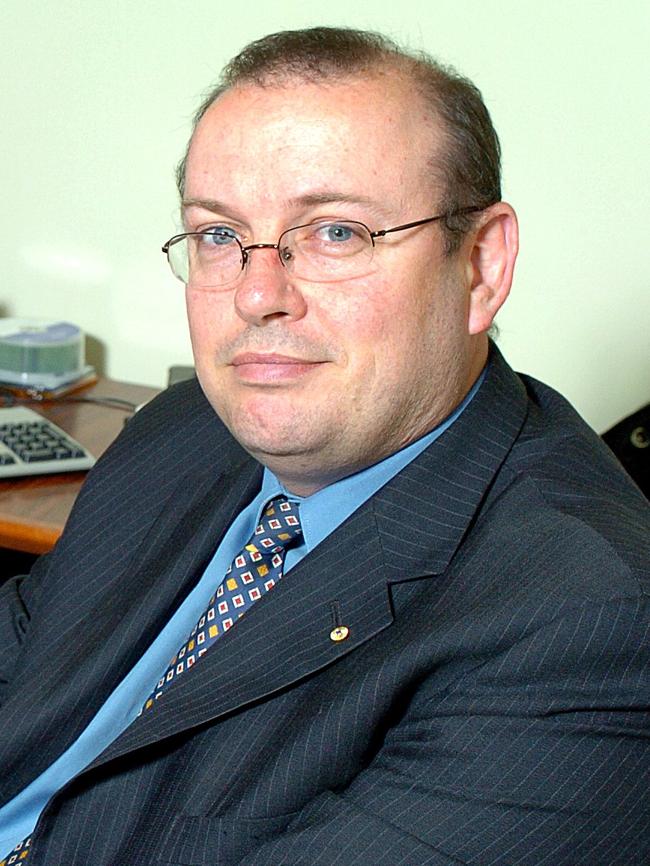
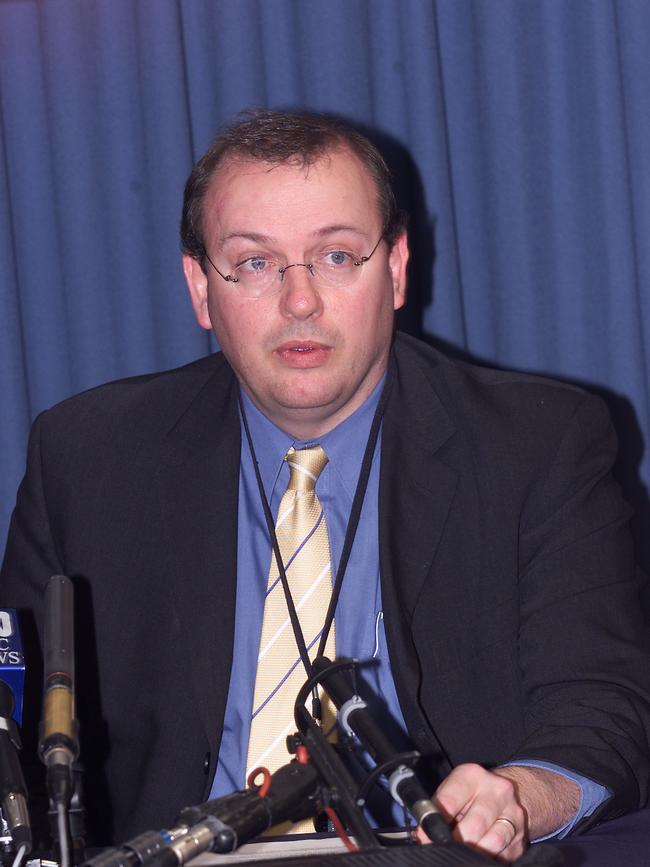
HM: Your first job?
GA: I had a few odd jobs at the races with greyhounds. I was the starter for a while, I was working in the catching pen, I was delivering some fish to the fish markets, but that wasn’t going to be a long-term thing.
HM: Were you desperate to be a policeman?
GA: Not really. I just wanted a secure job I think. Me and a mate decided we’d start applying for jobs like the army, South Australia police and the federal police. He got into the air force, and I got into the feds when I was 18. I left home with no money in my pocket and went to Canberra to do training in the federal police academy in 1980. My first pay cheque was a couple hundred bucks, and I thought I was rich!
HM: Didn’t know what to do with all the money!
GA: Exactly. To answer your question, I didn’t necessarily see police work as appealing, that certainly came later, but at that stage I was just trying to tread a safe path, given how tough things were in South Australia at the time.
HM: Did you ace the exam?
GA: It sounds like you know the answer! I did the federal police academy exam and I had an interview immediately afterwards. I remember the guy saying, “Your results academically are just OK, you’ve passed, but not with flying colours. But you are tall, so …”
HM: Tall got you in?
GA: It did … I was 6 foot 4, and that was a major factor in getting me into the police, not my academic results. It wouldn’t happen these days!
HM: I’ve got three kids. I’m not sure how comfortable I’d be if one of my kids told me they were joining the police force. How were your parents?
GA: They were happy I’d got a job! I was with my mates, having a good time as you do. They thought it was good that I had something steady to do.
HM: You joined at 18. At first, what was the role?
GA: The federal police at that time had only just been formed, and they had a general policing community role in the ACT. Then they had a broader role (investigating) organised crime, drug trafficking, drug smuggling, and at that time, Commonwealth frauds and all that investigative-type work. They also did protection of dignitaries. I started out doing that work at the academy and graduated, did a bit of the community stuff, and then came to Melbourne.
HM: Working with prime ministers?
GA: Yes, initially. I started with guardian and protection type work initially, when Malcolm Fraser would come to town, as he was a Victorian, then Bob Hawke — I’d be assigned to look after them.
HM: That’s a lot of pressure, I’d imagine?
GA: It was. Eventually I got into the investigative side of things and spent some time just building up my skills around investigations. I went through detective training programs, which was a three or four-year thing, and into the National Crime Authority, which was a high-level national task force in organised crime working with various state police forces. That got me across what state police were doing. It was the late '80s when I started doing all that work. After that I was promoted to Detective Sergeant, running crews and chasing drug importers for a while.
HM: Without being flippant, that seems like it would be pretty exciting work. Maybe I’ve watched too many Scarface and American Gangster and Godfather movies, but it would seem to be quite a stimulating role.
G A: You’re right, it was, very much so, because I was only a young fella! It was very exciting work to do, particularly in the drug area, because we’d be doing raids all the time. These days, when we do raids of high-risk offenders, we plan every inch of it. Back in those days, a few went around the front, a few went around the back, and you’d ram the door in and away you go!
HM: Sounds pretty hairy in retrospect. What was the drug then that was prominent?
GA: Heroin. Sometimes you’d get onto a cocaine importer, and they were a bit harder to catch because it was a higher-end drug in terms of the users, and the importers tended to be a bit sharper, and harder to get onto. They were good jobs when you had a cocaine importer you were chasing, you felt like you were matching wits with a smarter crook. Back in those days you were having a good time, and these days you look back and think of some of the risks you took … you’d be horrified, but back then it was just how we did it.
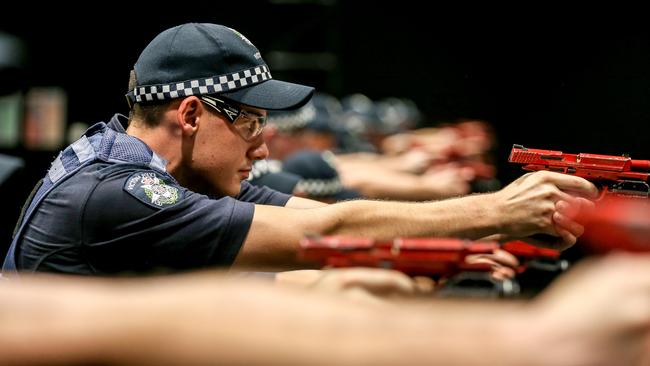
HM: Horrified in terms of?
GA: Really around the safety and planning. These days at Victoria Police we’ve got a major safety focus on everything we do: the staff are trained with defensive skills, to use firearms, have much better equipment, and we plan our operations as best we can. We’ve got active shooter training, we’ve got the traditional training in cordon and contain, negotiation, but back in those days, no matter which police force you were with, none of that really happened. Fortunately, in my case no one ended up getting killed.
HM: There must have been a moment where you realised, whether it was as an 18-year-old or further down the track, that you’d chosen a profession where you were risking your life, regularly, for the sake of a pay cheque. Was there a moment where you thought, “I almost got killed today!”
GA: We intercepted some bikies up on the highway out of Ballarat one night, we believed they were running around with cocaine importations. We had a whole range of people ready to do an intercept on the highway, and things went a bit haywire with the comms and it ended up just being me and my mate in the car.
HM: Just you two, and how many bikies?
GA: There were four of them, and we knew they were armed. We confronted them, and got them out of the car, and as they got out of the car, thankfully one of them dropped his firearm to the road and surrendered, and I was thinking, “Thank God for that — if he had gone the other way and started firing away it would have been interesting!’’ It was pitch black, and all the planning we’d done just went out the window because of the way the comms had worked out. We didn’t know where the targets were; we were the only ones who had a car on them, so we knew we’d lose them all together if we didn’t intercept them. We just got lucky they were in a mood to lay down the gun and not fire. In the end, we got about 4kg of cocaine out of the seizure which at the time, was a record street seizure of cocaine.
Horror of the Bali bombings
HM: From what I understand, the big test in your career was all around the Bali bombings. Was that the first time you had direct dealings with terrorism?
GA: I had worked for a couple of years at the Australian Embassy in Jakarta, and that was as a police liaison officer in the late '90s. I went to language school and learnt the language a bit. I started in the police liaison role, working at the embassy in Jakarta, facilitating various investigations, whether they were people smuggling or drugs or organised crime — whatever it might be. I did have a range of contacts in the Indonesian police at that time, so a few years later when the Bali bombings happened, the Commissioner directed me to Bali as the Operational Commander to try and provide assistance to the Indonesian police, but also co-ordinate the international effort.
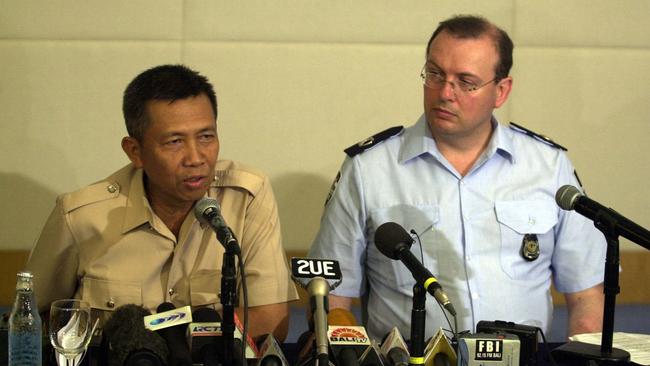


HM: It must have been unbelievably complicated and challenging?
GA: We had victims from more than 30 different countries, so there were a lot of international police coming into Bali. We had to co-ordinate and lead that as well. We had about 500 police at one stage in Bali assisting the Indonesians, from crime scenes to identification, and ultimately the investigation and capture of the terrorists involved. There were more than 200 deaths there. It was terribly sad. So many innocent lives destroyed and lost. That was my first major exposure to terrorism. Following that I was appointed as the Federal Police Assistant Commissioner for counter-terrorism. We had resources all around the world at that point focusing on terrorism. We spent a lot of time on planes, attending various places around terrorists and where terrorism was happening around the world, working with international law enforcement efforts and try and get ahead of them all.
HM: When I think of what you’ve just talked about with the Bali bombings, you must see some things that are very, very hard to forget.
GA: You do actually, Hamish. There was a horrendous crime scene there, particularly the mortuary in Denpasar. It was just so ill-equipped, like any mortuary would have been at that time, for that many victims. They had to lay the deceased down on the walkways, and they were throwing dry ice from bags, under sheets, on and around the deceased, to try and keep the victims in some sort of condition prior to post mortem examination. It was a terrible scene. We certainly had members who were badly affected from exposure to that. Some friends of mine are still struggling today with things that they saw during that time.
HM: How do you try and cleanse your mental catalogue of such horrific memories?
GA: Everyone’s different. I’ve never had any issues with it to date, touch wood. I know some people lose sleep or can’t sleep well or much at all, which causes them great distress and then mental health challenges flow from that. I’ve been fortunate in that I haven’t had that impact on me.
HM: You hear about Vietnam vets still shivering when they hear a noise that takes them to a place that they wish they’d never been to.
GA: Certainly. The smells too, for me. If you’re around deceased persons, particularly people impacted by fire, if you ever smell the odours it hits you straight away. I’ve had occasion to notice that, but not to the extent that it has caused any issues. When our members are exposed to significant crime scenes, particularly if there’s anything that brings them back to anything personal, that can be exacerbated as well. We’ve only learnt more about this in the policing context in recent years. For our emergency services first responders, there are some unique trauma-related mental health challenges that we’ve learnt more about.
HM: I’ll ask you about first responders in relation to April 22, but in terms of the terrorism piece, given how much time you’ve spent around either the outcomes, or the effects of terrorism, are you better at understanding how terrorists think, and why they’re doing what they do? Or do you continue to come up with no explanation?
GA: I’ve come to understand the motivations and what sits behind their actions. There’s a lot of different conflicts around the world. People are motivated by the issues they have in their family, in the initial sense, and that tends to manifest itself into more of a political ideology, and political motivation. They’re a part of a struggle that they then feel a need to contribute to, and sacrifice to. At its very core, that’s what sits at the motivation of terrorism. So I understand those motivators, but you can never see a way where anything condones violence. We’re all about trying to prevent violence. It’s got to stop somewhere, and it’s got to stop by enlightening communities. That’s where it needs to start — enlightening people of all backgrounds about what a peaceful future needs to look like.
The scourge of drugs
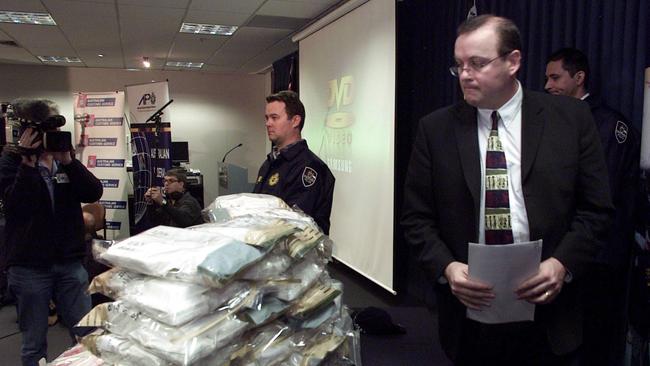
HM: Let’s hope. Just on the catalyst of so much crime now, it might be generalising, but has ice and the proliferation of ice given you a level of work not seen before?
GA: There are some unique aspects to ice. We’ve always been trying to deal with the impacts of illicit drugs, and there are a great deal of health impacts that society says we don’t condone, and in fact we make illegal the trafficking of those drugs, because of those social and health impacts. Across the years, whether it’s with LSD, heroin, cocaine, amphetamines, we’ve always been chasing those ills from the policing context, but ice in itself has had some more difficulties associated with it.
HM: Such as?
GA: One of the impacts is that some people have significant psychosis on it. That can lead to significant levels of violence while the person is under its effect. For us, that means injuries to the community, it means injury to more officers, it means significant road trauma, as people are just driving recklessly on ice and causing road trauma to innocent road users, including death. There are significant elements to that, but also, there’s been a real targeting of rural communities with ice by distributors and dealers, and for us, in rural communities we really see the impact because young people are really becoming disabled through the use of ice and this really impacts rural communities where that population can’t sustain that sort of injury. You’re a sports-orientated person, so if you think of your footy clubs and netball clubs, they often, in country towns, are the life of the town. Suddenly you lose that, and the young people that would normally be really at the centre of all that activity are just not there. It does rip at the centre of rural communities, and that’s been a real worry of ours over a number of years now.
HM: I’ve done some work with Foundation ACE, which is a foundation against child exploitation. I was horrified, because a map was shown of Melbourne, of where right then and there, there was suspect activity going on. I was horrified at the vast numbers of children being exploited on a daily basis. It really affected me. That must be hard for you to digest.
GA: Every month I get a map on my desk that has similar data on it, particularly those people that are accessing child abuse images online. We data capture a lot of that traffic, so we know where those computers are. We have teams that go out and do warrants all the time on those particular people that we identify by their computers, that are accessing child abuse images online.
HM: I just couldn’t believe the numbers — it was sickening.
GA: The numbers are prolific in every part of Melbourne, every part of the state, and sometimes even in small country towns you’ll see it pop up, people accessing this material. It’s horrendous, because we’re not talking about even things at the general pornography end, as serious as that is. These are the ones that we know are serious child abuse images. They are the most graphic images of abuse of children that are being shared. It’s happening every single day. What’s been happening more and more in recent times have been the live shows, so people can pay money, get online, and can order the abuse to happen in front of them. Live. That’s becoming a far more common phenomenon.
HM: I have three young children … it is just unimaginable what people are doing to these young, innocent, defenceless people in order to profit, or feel personal pleasure.
GA: You can’t get your head around either side of it. The Australian Crime Intelligence Commission recently released their latest study into it. They’ve looked at the financial transactions, and the people that are paying for the stuff. It’s another aid for us in identifying where they are, and where we can go and try to find them. It is a clear crime for people to be paying for the viewing of a child being abused, as well as the abuse itself. More and more domestically here in Victoria we are getting to know the links between that activity and the contact offending here in Victoria. The most prolific users of that child online abuse material are people who have significant criminal history.
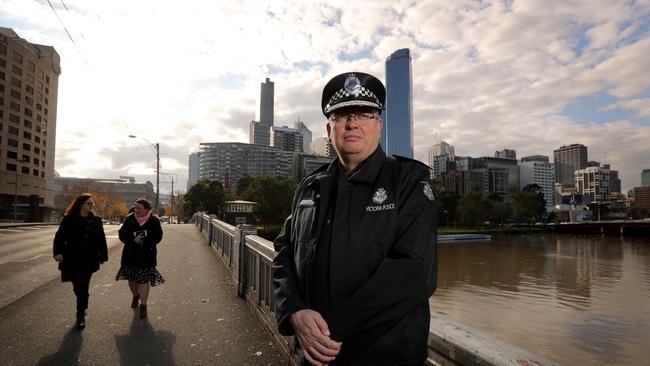
HM: How often are we making a significant impact on those offending or viewing?
GA: Sadly, we are only just scratching the surface. You could have three times the population of the Victoria Police full time on it, and still not get it all.
HM: And that’s just in Victoria. Every day so many young lives are being destroyed for profit and for pleasure …
GA: Sometimes we do get live victims in Victoria. We’ve had cases with children being abused here in Victoria, and that’s been broadcast and available elsewhere.
HM: It’s horrific. It must be a complicated balance between revenue raising, and fighting criminals like these sex offenders. When a highway officer pulls over a driver doing 64kmh in a 60kmh zone, I understand it, but I always feel the sex offender should be more of a priority. It must be quite a fine balance that must frustrate you?
GA: You’ve got to be able to chew gum and walk at the same time. If you talk to someone who’s lost someone on the roads as a road fatality, they’ve lost people in a very sudden and tragic way. Imagine losing a child that’s just heading into the prime of their life, and then, bang it’s all over. Just going down to the shops, or out on a Saturday night, and then that’s it, they never see them again. That’s real trauma that people are dealing with every day, so if you ask those people, they’ll say you should have every car out trying to stop people being killed on the roads. If you have in any way been connected to these children that are being abused, they’ll be saying to you, “Everyone should be out all the time dealing with child sexual abuse”. The list goes on, and on, and on, as you might imagine. You’ve got to boost your resources to try and tackle all the issues, whether it’s family violence, whether it’s crime on our streets, carjackings, home invasions. The list goes on. You’ve got to be able to devote resources to try and deal with all of those issues. That is a constant task, a balancing act. You try your best to be informed about the risks and try to mitigate and deal with the biggest risks. It’s just a constant challenge. That officer who’s intervening on that traffic matter, they’re not revenue raising, they’re thinking about what might happen down the road.
HM: Yep.
GA: The community can see that as revenue raising, because it does raise revenue, but when you talk to those officers that are doing it, they’re not doing it thinking, “Here’s a chance to raise money for the government”. They’re thinking about it from a safety perspective.
The police tragedy that rocked Victoria
HM: Point well made. You talked earlier about first responders. April 22 was arguably the darkest day in the history of Victoria Police. Where were you when you heard the news of what had happened (four officers killed on the Eastern Freeway)?
GA: Because we were in the middle of COVID, I’d been doing a lot of work on video conference. I was between video conferences, and I thought, I’ll get home and do the remaining conferences from there. I’d only just been dropped off, and I got a phone call to say that we were dealing with possibly a few members that may have been killed in a collision on the freeway. I turned straight around, went back to work, and it gradually got worse from there.
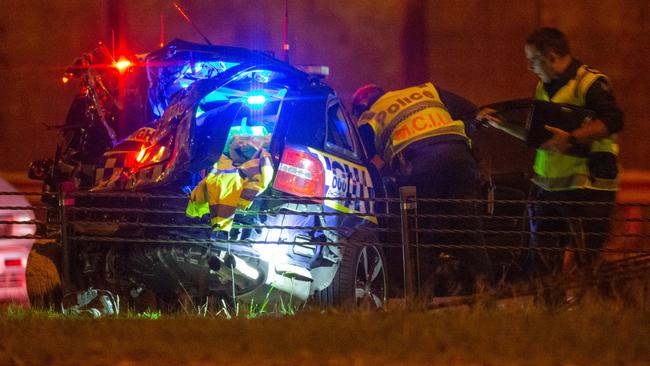
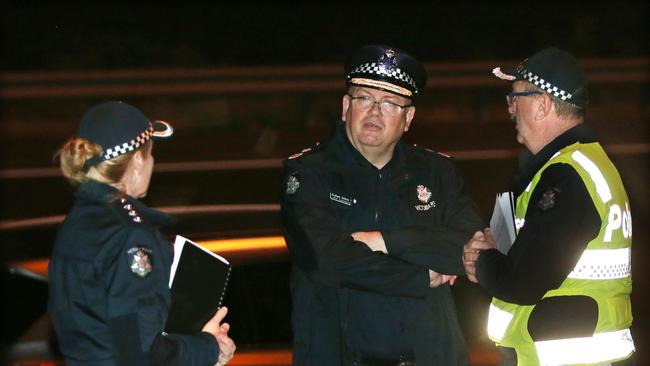
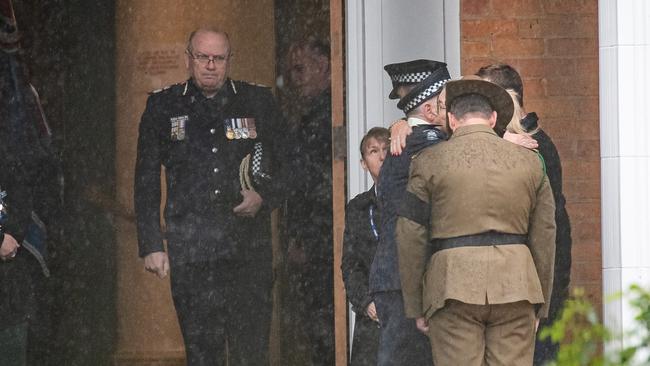
HM: How does the information flow to you?
GA: It went from, “We think there’s a fatality”, to two, three, and then four fatalities, in a very short space of time. Getting out to the crime scene straight away was important. We were trying to make sure that we had the many things that you’ve then got to put in place in terms of responding to that. Nightfall quickly fell, and we went from the crime scene back into the office here, and many hours followed in terms of making sure that things were set up well from not only an investigative point of view, but also the welfare of the families impacted, and all the officers impacted, making sure we had the right support around everyone who needed it. Talking through our broader work force, talking to the community. There’s a mountain of things you’ve got to do immediately, so you set about doing all of them.
HM: Who has the job of telling the victims’ families that their loved one isn’t coming home? It must be the most extraordinarily complicated, emotionally difficult discussion.
GA: Any officer will tell you they never forget when they have had to do that work. They sadly, do it every day. It’s one of the most difficult things to do. In this case, we had a senior officer go to all the families straight away, and some of them had an inkling that something was going on. Things were breaking in the press. What happens when these things happen, is everyone immediately texts everyone else if they know they’re on the job to say, “Are you OK?”. Or the members themselves text their families letting them know they’re OK. Nothing prepares them for that knock on the door, and it’s terribly hard for the officers.
HM: Do you see the families and the grief?
GA: I spent the following day going around to all the families myself, trying to provide some comfort for them. It is a terrible time for them all, and they want as much information as possible, like where we were going from there, and what the process is going to look like. It’s something that people want and need to know fairly early on, although, understandably, in the circumstances you’re not sure what you’re saying will always sink in. We try and tell them that we are going to make sure everything that can be done will be done, both from a welfare point of view and an investigation point of view. That’s something that I’ve had to do in the past, but not for four families at one time. That was something unique that I certainly won’t forget.
HM: Hard to imagine. What’s the biggest change you’ve seen since you were an 18-year-old, in terms of either increased crime, or the way you deal with things?
GA: Safety for police. The danger our members are confronted with gets worse all the time, even over recent years with the phenomenon of ramming police cars. We get police cars rammed with police sitting in them every week now.
HM: Every week?
GA: Every week. If you’re sitting in a car and you’re getting rammed, it’s a difficult thing to go through. It’s a very real safety risk, and we’ve had to train our members about how to deal with that phenomenon.
HM: Firearms?
GA: Firearm crime, knife crime, are both greater than ever. We put such enormous effort now into making sure that the training is as good as we can get it, but our operational policies and our procedures are structured so they can protect our police as much as possible. The systems around safety have changed so much, it’s incredible. You’d hate to think how many more police lives would have been lost over the years, but not for that effort.
Police relations in tense times
HM: How is the general relationship between the police and the community?
GA: We have a really good connection with the community in Victoria. I’ve had the opportunity to work, and live, in numerous states, and overseas, in my career. The connection that Victoria Police has with the community is the best connection anywhere I’ve seen. We are a part of the community, and as we saw from the outpouring of support we received after that terrible tragedy in Kew, the majority of people have got our back, and we’ve got their back. It is a relationship built on trust over decades. When you look at some countries, the relationship between police and the community is a really fractured one. It’s a real strength in Australia, and in Victoria.
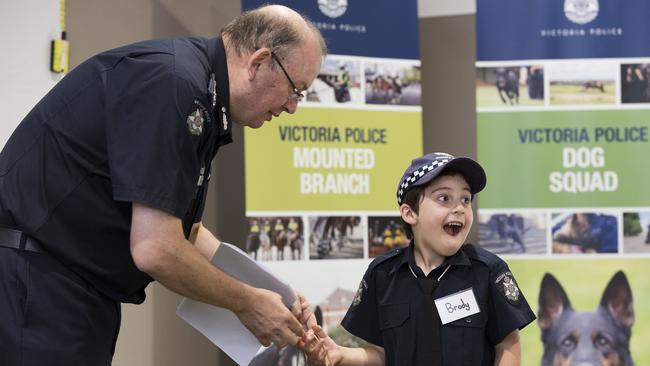
HM: That doesn’t seem to be the case in the USA right now. What have you been observing there?
GA: Its devastating to see those scenes in the US, but also a reminder, if ever it was needed, about the critical importance of trust between police and the community. What we are seeing in the US is a product of when that trust has broken down. We should never take the trust and consent of the community for granted and must work hard to keep and maintain that.
HM: Is there a change that you would make with the law that continues to frustrate you? You look at people that are jailed and you can’t believe they’ll ever get out.
GA: From time to time we advocate for legislative change, and the government of today is generally very supportive of that. One thing that always strikes me as peculiar, outside of that though, is there are people in the community who see themselves as advocates for civil liberties. Sometimes they’re very anti-police, often seeing police as violators of civil liberties, but I can tell you from the police point of view, we are the defenders of people’s civil liberties. We are out there protecting, preventing and dealing with offending every day, so people can live good lives with their families, and raise their families with some sense of security and confidence. That’s what the police do every day. We are about defending people’s human rights, we are about making sure that people’s rights are protected, but at the same time those people who offend against those rights are held accountable as a part of the process.
HM: I understand. You’ve talked about so many horrific days, is there such a thing as a good day in your role, or does it not exist?
GA: You have good days …
HM: What does it look like when you do?
GA: When you feel like you’ve helped people. This is a job that you really can help people, and really make a difference in, certainly internally. Look at the work we’ve done on mental health over the years on policing, for example. I’ve received so many emails and had conversations with police members and their families about the work that we’ve done there. It’s very satisfying every time someone says, “I’d probably be dead if we hadn’t done this”. It’s a great feeling.
HM: And externally, you must get pleasure in keeping us all safe?
GA: Community wise, when you can deal with people’s problems, help them, and then you get a card in the mail, or an email from someone thanking you for that, that’s always a very special thing to receive. That makes it a good day. I’m a keen student of history, and we’re very fortunate in Victoria Police, we’re one of the oldest institutions in the country. We’ve been around since 1853, and we predate things like the Civil War, Abraham Lincoln, the Federal Government. We’ve been around a long time as an organisation. I’ve had plenty of opportunities to bring that history forward for our police members to understand what we’ve done over the years, in understanding the importance of service to the community, and the people that have done it before them. Being able to lift that history off the page, and make it real for our members, which I’ve been able to do, is rewarding as the Chief Commissioner. After events like the Kew collision, you see how much members actually value that history, and the ceremony and tradition. It’s difficult work, policing, and people have some very difficult days. It needs to mean something.
HM: And the hardest part, Graham, of it all?
GA: It’s my 40th year in law enforcement. For me, the hardest part is dealing with losing members. Everyone in the force feels it when we lose a member, whether it’s through suicide, accident, or members being killed. Everyone in the force feels it, and you feel it from the top as well. They’re always the worst days, when someone comes in and tells you that it’s happened, or you get a phone call and see it in the alerts. They’re the worst days.
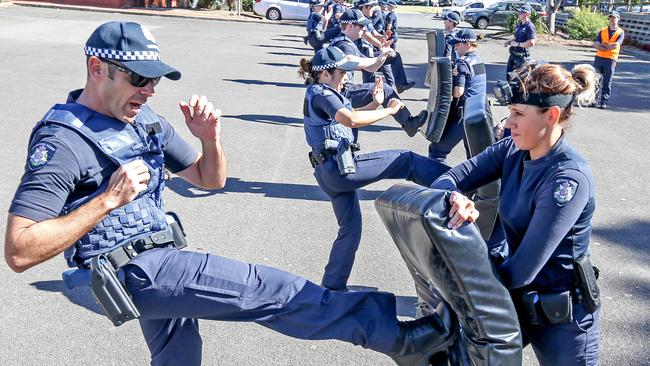
HM: What worries you most for the police force, and what may become the biggest issue?
GA: I’ll give you a positive and a negative. The positive for me is that in the last five years, particularly, we’ve been able to modernise. We’ve replaced a lot of our equipment, we’ve recruited an additional almost 3000 police, we’ve got new police stations, new cars, a new air wing, a new fleet of marine vessels, the body-worn video cameras, a whole range of initiatives that we’ve implemented that have really been able to modernise the force. We can be a much more visible and agile police force now, we’re able to respond much more quickly than we could, and we’re much better trained to do it now. Better equipped. That’s a real positive.
HM: The negative?
GA: The negative is that, post COVID, we’re going to have a lot of people who will be doing it tough economically, and we know our offender cohort will grow, so we’re going to be in an environment where potentially we’re dealing with more crime than before as a result of social conditions created through COVID. We’ll need all of that modernisation to do that. Melbourne continues to be the fastest-growing city in Australia — we’re getting new suburbs almost every month, and we’re going from a city to a metropolis. That means that we’re just going to have more and more challenges for policing, and a lot of it will be numbers to the ball quickly. We’ve got to be very mobile and get around in numbers quickly to deal with incidents as they arise.
HM: Great news. Is there one moment you’d love to have again? Someone you’ve missed, or regret someone you didn’t save? Anything you find hard to get over?
GA: There’s a couple of good friends of mine that took their own lives in the policing world. I didn’t see the signs, I knew them well, and one of them I’d seen only days before their suicide. I didn’t pick it, and if I had my time again, I should have worked harder at getting to the bottom of actually asking the hard questions. They were clearly struggling and I had no idea. You’re in a role where you can make a big difference, so of course when things happen, and there are many occasions where if you could, you’d turn back the clock.
HM: The AFL struggles to get umpires. Given all you’re going to need, are you going to be able to find what you need in terms of personnel?
GA: I think so. I hope so. It can be a challenge at times, that recruiting pipeline. In difficult times people put their hands up in greater numbers. We’ve been breaking all of our records during COVID, and the bushfires this year, with people wanting to apply and be a part of the force. When we’re in good times, it can be a challenge. You’ve really got to advertise and work hard to get the numbers through, but in challenging times there’s no problem. People want to be a part of helping and problem solving. It’s a good career, with purpose. We’ve been fortunate in that we’ve never had to drop our standards — in fact we’ve been able to lift them over time, and the quality of recruits that have come out of the academy are just first class.
HM: It’s been 40 years. On behalf of all of us, thank you for your service. I hope whatever is next is less stressful, and there arere some smiles there.
GA: If Port could win a premiership it’d put a smile on my face! Thanks, Hamish.
MORE HAMISH MCLACHLAN INTERVIEWS
ALISA CAMPLIN’S SECRET HEARTACHE


Add your comment to this story
To join the conversation, please log in. Don't have an account? Register
Join the conversation, you are commenting as Logout